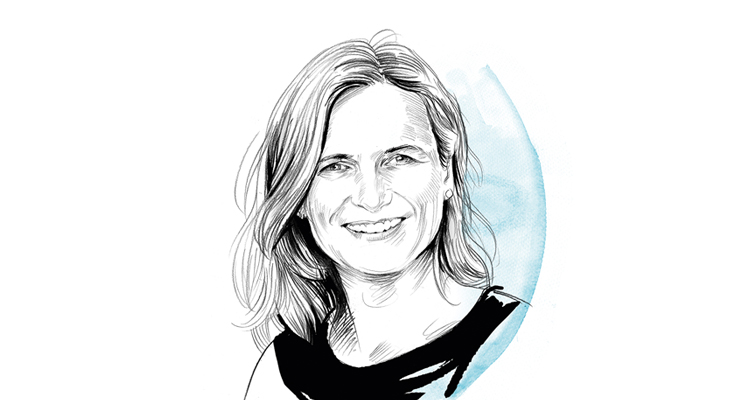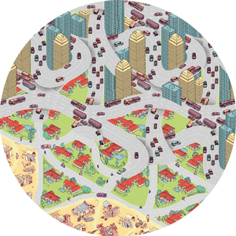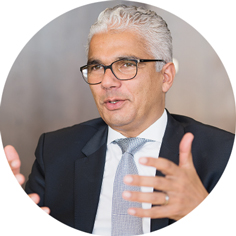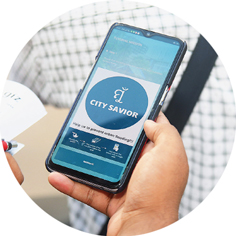Background
The future is urban
Cities and regions are on the front line when it comes to dealing with crises. That role has been underscored by the global coronavirus pandemic. A lot depends on their ability to respond: for example, the interaction between city and regional authorities on the one hand and national governments on the other, and between the private sector and civil society. As we can see right now, reliable information, municipal structures, neighbourhood support mechanisms and properly functioning public services are incredibly important. As economic hubs and centres of innovation, cities will play a crucial role in economic stimulus programmes and in the effective delivery of a ‘green recovery’. Whether we are successful in that also depends on whether societies are resilient and on the degree of social cohesion.

CARMEN VOGT
heads the Cities Section at GIZ.
carmen.vogt@giz.de
By 2050, just over two thirds of the global population – seven billion people – will live in urban environments. That expansion will include small and medium-sized towns in Africa and Asia that are well connected with their surrounding region. According to the German Advisory Council on Global Change, we need to build as much new infrastructure in the next three decades as we have since the beginning of industrialisation. That will require investment in the order of EUR 3.6 trillion every year. It is therefore clear that the global climate and development targets agreed by the international community of states in the 2030 Agenda and the Paris Agreement can only be achieved in collaboration with local actors. Without cities, two thirds of all national climate targets will simply not be met.
To illustrate the point, look at the materials we use for buildings, roads and cycleways. If we carry on using cement, steel and aluminium, we will not reach the target of keeping global warming to 1.5 degrees Celsius. That is why we are working with the private sector and the scientific community to develop sustainable construction solutions based on locally sourced, low-carbon materials.
Partnerships with city networks
Cities need to be more fully involved in planning for the future – as a matter of urgency. At GIZ, that urgency is reflected in our work. Our client base has grown in recent years. In addition to the German Development Ministry (BMZ), we work with the German Ministry of the Interior (BMI) and the German Environment Ministry (BMU) and are expanding established partnerships with city networks such as ICLEI, C40, the Cities Alliance and other multilateral actors. Many countries see their towns and cities as key partners that can provide solutions to the challenges that lie ahead in areas such as climate change, social equality and digital transformation. GIZ has been commissioned by the German Government to support cities and regions in Africa, Asia, Latin America and South-East Europe. For a long time, the focus was on individual sectors such as water, waste and mobility. Today, however, we have a more joined-up, holistic approach in these areas. Why? Because sustainable urban development is more than the sum of its parts. Our principal focus now is on people.
There is a great deal of interest in this approach, especially in Ukraine, where GIZ is working to improve living conditions in eight cities. 60,000 people have already contributed their ideas in a series of public dialogues. The approach has been a success, as their projects have been incorporated into urban development plans. In Morocco, too, city authorities have been working with local people to draw up strategies for improving public services, for instance regarding the use of green spaces, public areas and buildings. There is a clear demand for opportunities to link up and share ideas with others around the world, and in turn those mechanisms are strengthened by municipal partnerships.
The whole issue of urban development is very exciting and extremely varied, from highly tangible projects that involve building new infrastructure in response to local needs through to trials of digital solutions and measures to implement national policies and ‘smart city’ strategies. There is a real sense of conviction among our partners that cities are the arena in which the success of that transformation will be realised. Working closely with their residents, cities are tracing out a healthy, low-emission future well beyond the present coronavirus pandemic. Although cities and local governments are of course themselves affected by the crisis, it is becoming clear that cities can take action to promote social cohesion, meet people’s basic needs in terms of water, food, transport, accommodation and health, and offer the prospect of a better future. GIZ adopts a flexible approach when working with its partners on responses to the present challenges, for example by developing ideas – for resilient and interconnected cities offering a good quality of life – that can be implemented all over the world once the pandemic is over.
published in akzente 2/20
Agile or fragile
Essay
‘Sustainability remains a key issue’
Interview cities
Together against flooding
Report



